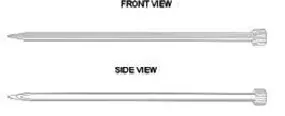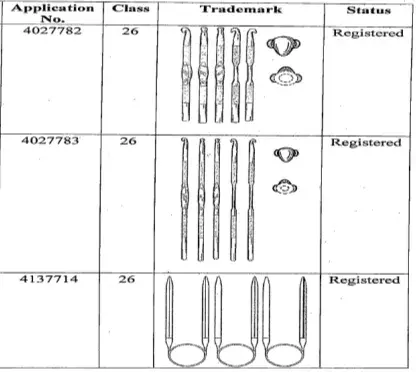By Ananyaa Banerjee and Titiksha Sinha
Introduction
The current appeal contested the order issued on October 01, 2018 (“refusal order”) which refused the Appellant’s trade mark Application No. 2735619 filed on May 12, 2014 (claiming use since January 01, 2014) seeking registration of the trade mark  /DEVICE OF KEEL in Class 26 under Sections 09 and 11 of the Act; and order issued on June 14, 2019 (“review order”), whereby review filed against the refusal order was rejected.
/DEVICE OF KEEL in Class 26 under Sections 09 and 11 of the Act; and order issued on June 14, 2019 (“review order”), whereby review filed against the refusal order was rejected.
Contentions of both the parties
- The Contentions of the Appellant
- The Appellant contended that they are engaged in the business of manufacturing various products such as needles, hooks etc., and hold several trade mark registrations concerning diverse patterns and shapes of knitting needles.
- The subject trade mark application was refused registration (and subsequently in the review order as well) on the basis that the same is a DEVICE OF KEEL and is descriptive to the kind and intended purpose for the goods in Class 26 i.e., knitting needles and crochet hooks.
- The Appellant contended that the said refusal was incorrect on the basis of the following reasons-
- The reference to the mark as DEVICE OF KEEL was incorrect as the subject mark depicts a pattern on the surface of a knitting needle that is inherently distinctive.
- Further, the pattern has been associated with the Appellant owing to its long, extensive and continuous usage.
- The Contentions of the Respondent
- The image of the subject mark (as provided in the application) is not clear and hence, there was no clarity as to the exact mark for which the registration is being sought.
Issue in the present matter-
Are the refusal order and the review order in accordance with the Trade Marks Act?
Findings of the Hon’ble Delhi High Court-
- The subject mark, a pattern on the surface of the knitting needle, is capable of being granted registration as the same is distinctive in nature.
- The Appellant has multiple registrations for shapes of knitting needles as well as patterns on the surface, some of which are given below for reference-

Therefore, the ground for refusal under Section 9 of the Trade Marks Act is not sustainable.
With respect to the objection under Section 11 of the Act, the court stated that both the conflicting marks cited in the Examination Report issued in respect of the captioned application are those of the Appellant. Hence, the objection is untenable.
Further, in regard to the Respondent’s objection on the lack of clarity of the subject mark, the court stated that the pictures of the subject mark in the Appellant’s written submission as shown to the court are conclusively clear and also, since no objection was raised by the Respondent on this issue at an earlier stage, this issue cannot be considered.
In view of the above, the Hon’ble Court directed for the refusal and review orders to be set aside, and directed for the subject mark to be advertised in the Trade Marks Journal. In case of any further oppositions, the same shall be decided on its own merits, uninfluenced by observations made hereinabove.
Conclusion
In India, like many other jurisdictions, the shape of the product should not be wholly functional in nature to avoid rejection of the trade mark (similar to designs also, wherein design rights do not subsist over functional ascpects)The “shape” of such marks should be distinctive that the general public inherently associates the mark with its source, without the need for any additional elements such as a name or logo.
This case is a good affirmation of the registrability of shape marks in India, and clarifies the specific prerequisites to be maintained in order to be eligible for registration.You may refer to our detailed article on shape marks: https://ssrana.in/articles/importance-and-challenges-of-protecting-a-shape-mark/

